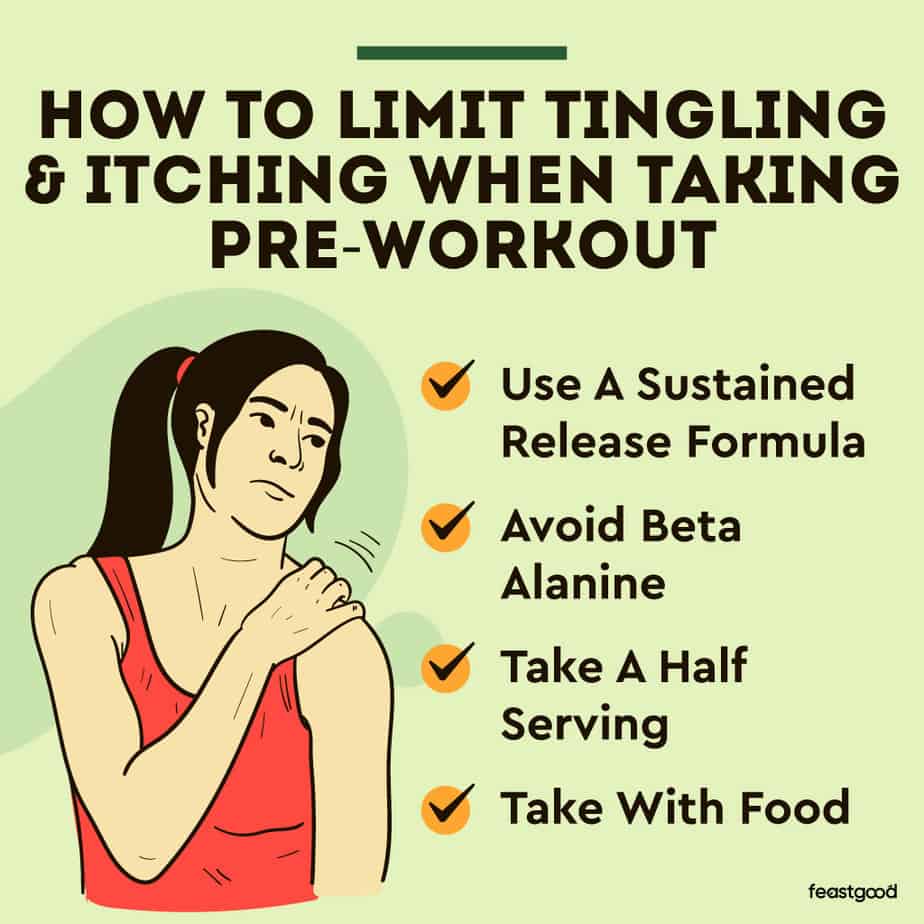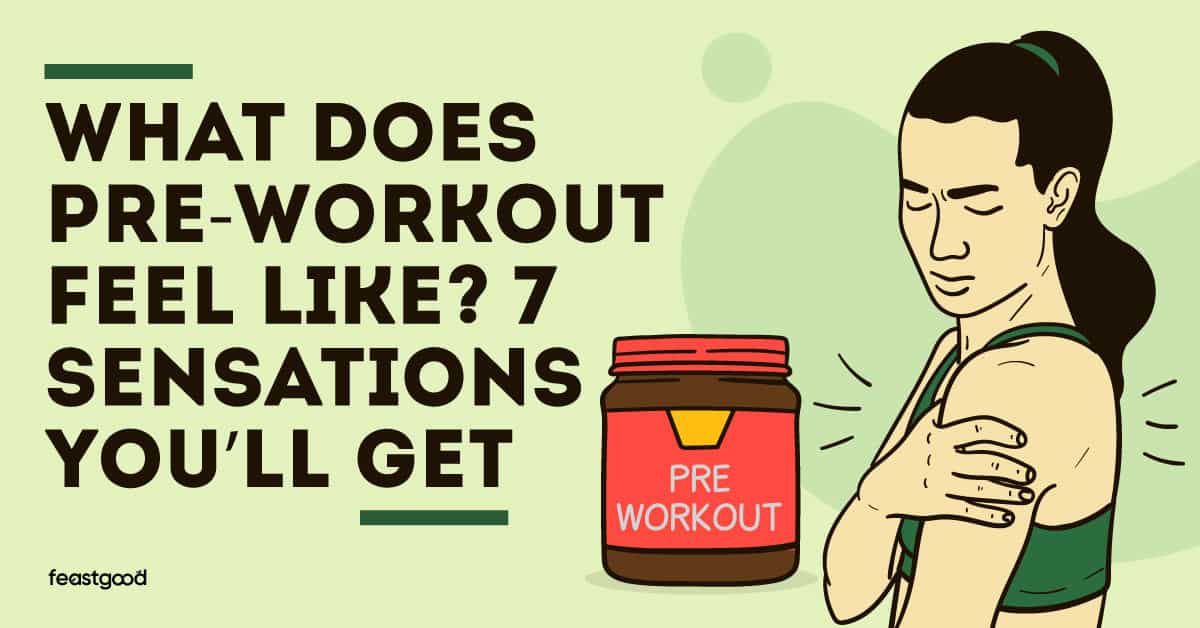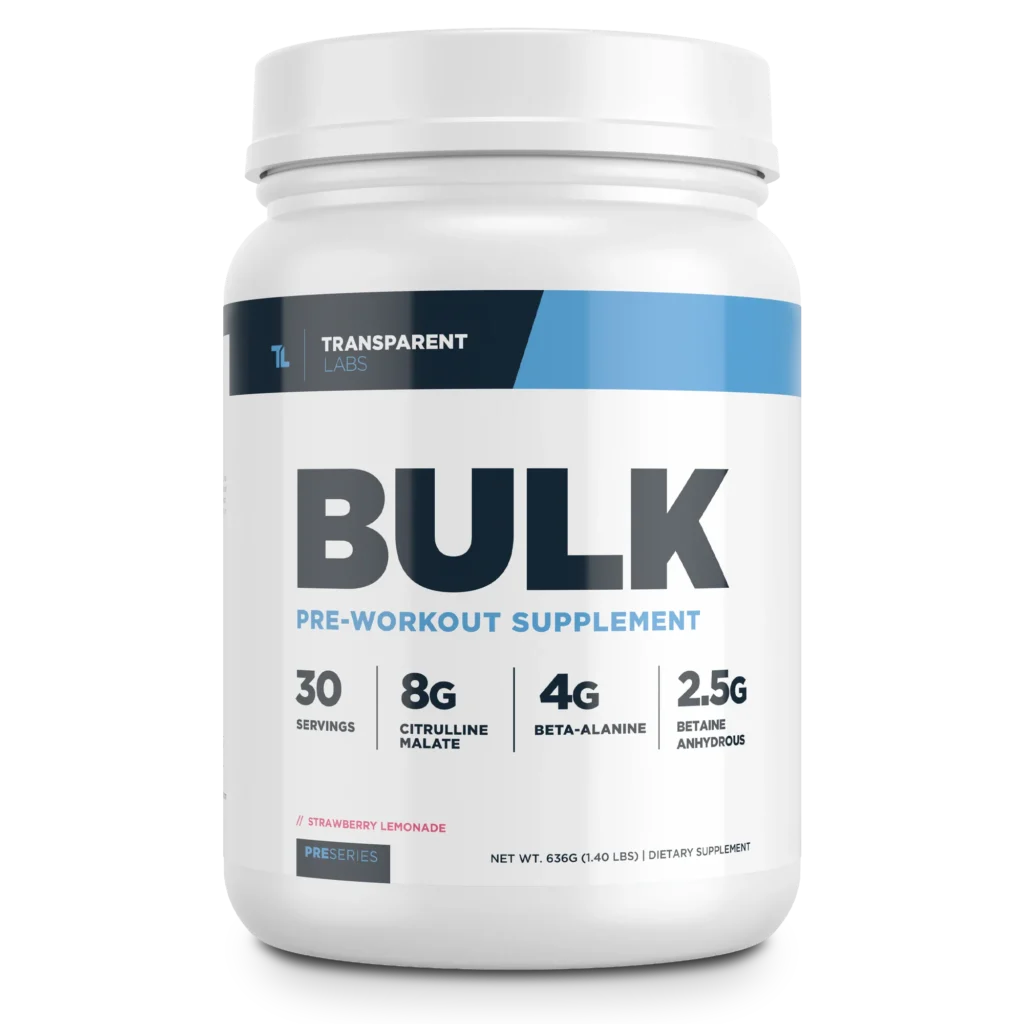When you first start taking pre-workout or if you’re considering taking it, you might be surprised to discover that beyond feeling more energized and alert during your workout, you could also be dealing with some unexpected and occasionally unpleasant sensations.
What can you expect to feel when you take a pre-workout? Along with a sense of increased energy, focus, and mood, seven common sensations when taking pre-workout include tingling, itching, warmth, numbness, skin crawling, jitteriness, and nausea. These sensations don’t happen for every person or with every pre-workout product as only certain ingredients cause them.
I’ve written this article to help you know what’s normal and what you can expect, as well as what common pre-workout ingredients to watch out for.
Key Takeaways
- The pre-workout ingredient responsible for sensations of tingling, itching, skin crawling, and numbness is beta-alanine.
- There are other ingredients (like caffeine) that can cause jitteriness or for your skin to feel flushed and warm depending on the dosage.
- There are easy strategies to limit these sensations while still getting the most out of your pre-workout.
The Common Feeling You’ll Get From Taking pre-workout
I’m sure many of you have seen pre-workout memes that say: “when the pre-workout hits” or “when the pre-workout kicks in.”
If not, here is one of my favorites:
So, what are these memes supposed to tell you about how pre-workout feels?
The main feelings you’ll get from pre-workout are a burst of energy and alertness, increased breathing and heart rate, and a heightened sense of focus. This is mainly due to caffeine, which acts as a stimulant.
It’s the same feeling you get when you drink coffee or energy drinks; however, the main difference is the dosage you get when taking pre-workout.
The majority of pre-workout supplements have 200mg of caffeine, and some have as high as 400mg.
In comparison, a cup of drip coffee has anywhere between 40-95mg of caffeine – so you’re getting 2-5 times the amount of caffeine intake in a short period of time.
One Reddit user said:
“I used to take caffeine pills/drink coffee [before my workout] but my pre-workout is on another level”
This person goes on to say he takes C4, which has 200mg of caffeine – no wonder he thinks it’s on “another level” with that amount of caffeine.
In addition to caffeine, there are some other ingredients in pre-workout that may cause new sensations, including tingling and itching.
Pre-Workout Ingredients That Cause Tingling & Itching
The number one ingredient that causes people to feel tingling & itching, or even the sensation of their skin crawling or mild numbness, especially in the face or fingers, is beta-alanine. The technical term for these sensations is paraesthesia, and it is a common but harmless side effect of beta-alanine supplements.
Some people even describe paraesthesia as feeling like they have little invisible ants crawling on their skin. I remember feeling like I needed to brush bugs off of my face the first time I tried pre-workout, but there was nothing there!
Other Ingredients To Watch Out For
Beyond beta-alanine, there are other common ingredients in pre-workout supplements that lead to different sensations:
- In high dosages, the caffeine in pre-workout is responsible for feelings of jitteriness, and for sensitive individuals, nausea.
- L-theanine works in combination with caffeine to enhance reaction time, while reducing the risk of headaches. So it’s also responsible for feeling alert and focused, but can actually lessen negative side effects.
- Niacin is a B vitamin (vitamin B3) that helps to increase energy levels and it can also cause skin flushing and a sense of warmth for some people.
Other common pre-workout ingredients ARE NOT linked with physical sensations like the ones I mentioned. These include betaine, branched-chain amino acids (BCAAs), creatine, l-citrulline or citrulline malate, l-arginine, and taurine.
How Long Does It Take For Pre-Workout To Start Working?
You’ll feel the effects of pre-workout within about 30-60 minutes of taking it, so aim to take your pre-workout supplement 30-60 minutes before the intense part of your training. That said, some ingredients in pre-workout need to be taken daily for several weeks to get the full benefit.
For example, creatine requires 1-4 weeks of consistent daily doses of 3-5g to reach saturation levels in your cells for maximum effectiveness.
Similarly, beta alanine supplementation of 4-6g per day is required for at least 2-4 weeks to show improved exercise performance.
Branched chain amino acids (BCAAs) are recommended for at least 10 days to see the results of decreased muscle damage and increased muscle protein synthesis (muscle-building).
- Related Article: Why Does Pre-Workout Not Affect Me? 7 Reasons
How Long Do The Sensations From Pre-Workout Last?
The sensations from pre-workout generally last 1-2 hours, but this varies from person to person depending on how quickly they metabolize caffeine and other pre-workout ingredients. The faster ingredients are absorbed and used by your body, the shorter time you will feel the sensations.
Also, larger doses of pre-workout, or pre-workout products that contain higher levels of caffeine, can cause sensations to last longer.
You might also feel the effects more if you have other sources of caffeine in your daily intake, such as coffee, tea, cola or chocolate. It’s important to keep track of your total daily caffeine intake so that you don’t exceed the recommended safe limit of 400mg per day.
- Related Article: Can You Get Addicted To Pre-Workout? (Yes, Here’s Why)
Are The Sensations You Get From Pre-Workout Harmful?
No, the sensations you get from pre-workout are generally not harmful unless you feel pain in your chest or armpit, or shortness of breath which could be signs of a dangerous underlying condition. Other sensations like tingling, itching, numbness, skin crawling or jitteriness & nausea may be unpleasant but not harmful.
If you do feel pain or tightness in your chest, shortness of breath before you even start exercise, or pain in your armpit, consult a medical professional right away and do not begin your workout.
For the other harmless side effects, if you find them unpleasant, check out my tips below to reduce those feelings.
Related Article: This Is How Much Pre-Workout To Take For The First Time
How To Limit Tingling and Itching When Taking Pre-Workout

There are several ways to limit tingling and itching and other side effects when taking pre-workout:
Use A Sustained Release Formula
If you can find a pre-workout product that has a sustained release formula, you can limit the sensations of tingling and itching from beta alanine.
Avoid Beta Alanine
If you find that you are very sensitive to beta alanine or you can’t find a sustained release formula, you can also choose pre-workout formulas that do not have this ingredient.
Take A Half Serving
Another way to limit the feelings of tingling and itching is to take a half dose of pre-workout.
Take With Food
Finally, drinking your pre-workout supplement and also eating some food for a pre-workout snack can slow the release of the pre-workout ingredients into your body, which can reduce the sensations of tingling and itching.
Will Pre-Workout Make You Crash?
Yes, pre-workout can make you crash if the dose is too high for you, leading you to feel exhausted and struggling to focus after your workout. This is a combination of pushing way beyond your normal limits and intensity in training, and also the withdrawal effect as caffeine leaves your body.
The good news is that there are a lot of ways to overcome the crash, or avoid it in the first place.
- Be mindful in your training: even though you’re feeling great and energetic, aim to follow structured training progressions, increasing your weights or number of sets/reps by 10-20% each week and not 50% or more all in one session.
- Get a post-workout snack: eat right away after your workout with a snack or meal that is high in protein and quick-digesting carbs and low in fat and fiber. This will help to replenish your energy levels and reduce the feeling of a crash.
- Reduce your serving of pre-workout: experiment with taking a half a serving of pre-workout so that you feel energized but not overly amped up.
Related Articled:
- Can You Take Pre-Workout Twice In One Day? (Risks Explained)
- How Much Pre Workout To Take For The First Time
References
Haskell-Ramsay, Crystal & Kennedy, David & Milne, Anthea & Wesnes, Keith & Scholey, Andrew. (2008). The Effects of L-theanine, Caffeine and their Combination on Cognition and Mood. Biological psychology. 77. 113-22. 10.1016/j.biopsycho.2007.09.008.
Kamanna, V. S., & Kashyap, M. L. (2008). Mechanism of action of niacin. The American Journal of Cardiology, 101(8, Supplement), S20-S26. ISSN 0002-9149. https://doi.org/10.1016/j.amjcard.2008.02.029.
Eric T. Trexler, Abbie E. Smith-Ryan, Jeffrey R. Stout, Jay R. Hoffman, Colin D. Wilborn, Craig Sale, Richard B. Kreider, Ralf Jäger, Conrad P. Earnest, Laurent Bannock, Bill Campbell, Douglas Kalman, Tim N. Ziegenfuss & Jose Antonio (2015) International society of sports nutrition position stand: Beta-Alanine, Journal of the International Society of Sports Nutrition, 12:1, DOI: 10.1186/s12970-015-0090-y
Fouré A, Bendahan D. Is Branched-Chain Amino Acids Supplementation an Efficient Nutritional Strategy to Alleviate Skeletal Muscle Damage? A Systematic Review. Nutrients. 2017 Sep 21;9(10):1047. doi: 10.3390/nu9101047. PMID: 28934166; PMCID: PMC5691664.
Yoshiharu Shimomura and others, Exercise Promotes BCAA Catabolism: Effects of BCAA Supplementation on Skeletal Muscle during Exercise, The Journal of Nutrition, Volume 134, Issue 6, June 2004, Pages 1583S–1587S, https://doi.org/10.1093/jn/134.6.1583S
About The Author

Lauren Graham is a Precision Nutrition Level 1 certified nutrition coach. She focuses on helping busy professionals balance healthy eating and purposeful movement. Lauren has a background in competitive swimming and is currently competing as a CrossFit athlete. She has a passion for training, teaching, and writing.
Why Trust Our Content

On Staff at FeastGood.com, we have Registered Dietitians, coaches with PhDs in Human Nutrition, and internationally ranked athletes who contribute to our editorial process. This includes research, writing, editing, fact-checking, and product testing/reviews. At a bare minimum, all authors must be certified nutrition coaches by either the National Academy of Sports Medicine, International Sport Sciences Association, or Precision Nutrition. Learn more about our team here.
Have a Question?
If you have any questions or feedback about what you’ve read, you can reach out to us at [email protected]. We respond to every email within 1 business day.


